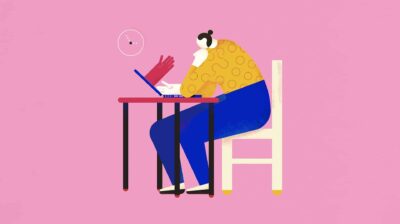Dealing with anxiety
How to keep those anxiety levels down

People experience anxiety for many reasons, such as worries about climate change or facing an increase in workload. Feeling anxious or stressed from time to time is a perfectly normal response to the demands of everyday living. You might become stressed by a job interview, an upcoming exam, or the accumulation of household chores.
Experiencing mild to moderate levels of stress occasionally can be helpful. Feeling temporarily stressed or anxious can allow us to avoid potential danger in our environment, such as a busy street with fast-moving traffic. However, if chronic stress starts affecting your ability to perform your daily tasks, you might benefit from seeking support. Similarly, you might be interested in learning some new coping techniques.
If you would like more information on where your anxiety might be coming from, as well as the difference between having an anxiety disorder and feeling anxious, take a look at our factsheet on anxiety.
How can I stop feeling anxious?
Anxiety rooted in different causes may require different types of treatment. For example, if anxiety is linked to an underlying medical condition, treating that condition can help with the anxiety. In general, however, anxiety not caused by another health issue is treated using psychotherapy or counselling, antidepressants, or a combination of both. If you have been feeling anxious for more than 6 months, it may be a good idea to see your GP to discuss treatment options.
In the meantime, you may want to learn how to stop anxiety in the moment. Perhaps you are interested in adopting self-care practices to improve your overall wellbeing.
Below are some anxiety self-help strategies that you can try on their own or alongside other evidence-based recovery strategies.
Talk to someone
Speaking to a trusted person, such as a close friend, partner, or family member, about how you’re feeling can help relieve the burden of facing your anxiety alone. Talking to someone who isn’t involved in the stressful situation can give you a fresh perspective. Sharing your thoughts and ideas with them can help you discover new ways to cope with or approach your problems. The problem or stress trigger might not be resolved immediately, and that’s okay. Sometimes, just having someone listen to and acknowledge your feelings can help you calm down in the moment.
If you’re feeling apprehensive about reaching out to someone, you may find it helpful to read our factsheet on opening up to someone about your mental health.
Alternatively, you might feel more comfortable speaking to a mental health professional or trained volunteer through:
- Our 24/7, free, anonymous messaging service Text About It
- A support organisation or charity, such as Aware
- A counsellor or psychotherapist
- Your GP, who can refer you to appropriate, low-cost mental health services
If you want to learn more about getting help, read our factsheets on accessing mental health services in Ireland. They cover how to start your mental health recovery journey and how to access private counselling and psychotherapy in Ireland.
Try mindfulness-based practices for anxiety
Practising mindfulness through breathing exercises and regularly checking in with how you’re feeling can help reduce stress and anxiety. Mindfulness is the practice of paying full attention to the present moment, noticing your thoughts, feelings, and surroundings without judgement. It’s about being aware of what’s happening right now, rather than getting caught up in worries about the past or future.
If you want to find a mindfulness technique that works for you, read our factsheet on mindfulness-based practices and grounding. Bear in mind that practising mindfulness and engaging in relaxation or grounding exercises is not a quick fix for long-term mental health difficulties. To benefit from these mindfulness-based practices, it’s often necessary to practise them daily or several times a week as part of your mental health recovery.
If you’re not benefitting from mindfulness, that’s okay
While mindfulness-based practices like meditation can be helpful for mild-to-moderate stress or anxiety, they may not be suitable for everyone. A recent systematic review found that about one in twelve people may experience adverse or unwanted effects from meditation, which can sometimes worsen existing anxiety or depression. In a systematic review, researchers look at most, if not all, of the existing research on a particular topic to provide a detailed overview of what the evidence shows. Based on the results of this systematic review, it’s important to listen to your body if you find that your anxiety gets worse after practising meditation.
Negative effects or no improvement from mindfulness practices might mean you need to adjust your practice to better fit your needs and preferences, such as if you find it difficult to sit still or have sensory processing issues. Alternatively, it could suggest that another approach might be more effective for you.
Exercise
Regular exercise can help relieve tension and improve mood through the release of natural brain chemicals called endorphins. According to ‘Every Move Counts,’ the new National Physical Activity and Sedentary Behaviour Guidelines for Ireland, two and a half hours of moderate exercise per week can lead to improvements not only in physical health but also in cognitive function and mental health.
If you’re interested in learning more about exercise, including how to exercise with limited mobility or when you’re short on time, check out our factsheets on exercise.
If it’s been a while since you’ve exercised or you’re new to it, it can be a good idea to start small. You could begin with gentle stretches or light activities and slowly work your way up to more vigorous exercise over time. This gradual approach can also help if you’re finding it hard to stay motivated or want to build long-term habits. Set goals that feel achievable and move at your own pace. Regardless of your fitness level, it’s important to listen to your body.
If you live with a physical impairment or chronic health condition, you may need to adapt exercises to fit your individual needs and preferences. While living with certain impairments can make exercise challenging, it may still be possible to find movements that are comfortable and do not make your condition worse. It’s usually a good idea to talk to your doctor or a medical professional before you make any big changes to your exercise routine, especially if you have a chronic health condition or disability that affects your mobility.
Get enough sleep
Without enough sleep, even small daily demands can feel overwhelming, making it harder to manage them effectively. While certainly not a cure-all, sticking to a regular bedtime and aiming for seven to eight hours of sleep each night can help you feel more resourced during times of high stress.
If you’re finding it hard to fall asleep or stay asleep, creating a regular sleep routine might help. Going to bed and waking up at the same time each day can help regulate your body clock. Whenever you’re introducing a new routine, try to be patient with yourself—it can take time for new sleep habits to translate into noticeable improvements in your sleep quality.
There are also other steps you can take to improve your sleep:
- Avoid activities in bed that keep you awake, such as watching TV or using your phone
- Try to enjoy relaxing rather than focusing on the goal of getting to sleep
- If you’re still awake after 20 minutes, get up and do something calming in another room
- Try to wind down for about 90 minutes before bed, steering clear of devices that emit “blue light.”
- Use an alarm clock instead of your phone, and keep your phone out of reach at night
Eat a balanced diet
Maintaining a balanced diet and staying adequately hydrated can help to improve your overall sense of wellbeing. When combined with other lifestyle changes, like better sleep, stress-reduction techniques, and reaching out to others for support, a healthy diet can help reduce your anxiety.
However, it is important to recognise that for many people, dietary changes alone are unlikely to eliminate long-term anxiety. Changes in diet do not address anxiety rooted in other unresolved issues.
Limit your intake of coffee, cigarettes and alcohol
Having the occasional pint or cup of coffee is unlikely to cause too much harm. However, research shows that excessive consumption of drinks containing caffeine or alcohol can make your anxiety worse. Similarly, studies have shown that smoking nicotine—despite being a temptation for many during anxious periods—can actually increase your levels of anxiety and tension. This also applies to vaping nicotine.
If you’re considering reducing your nicotine intake through vaping, you may want to explore our series of factsheets on vaping and nicotine replacement therapy (NRT).
Make time for fun
Research shows that engaging in enjoyable activities, like hobbies or spending time with friends, can help offset the negative effects of stress. While you might not be able to eliminate stressors like exams or caregiving responsibilities, scheduling positive experiences into your routine can make a big difference.
Understand the root cause of your anxiety
When seeking long-term relief from anxiety, it is important to treat the cause of anxiety and not just the symptoms.
Lifestyle changes like eating well, getting enough sleep, and exercising regularly can support our physical and mental wellbeing. However, experiencing high stress or anxiety levels for a long time can signal the need for a change in behaviour or environment. This change could involve treating an underlying mental or physical health condition. Alternatively, you might benefit from changing aspects of your everyday work and/or living environment.
Even if changing your environment isn’t possible, there may be ways you can reframe how you think about the situation. Doing so can help ease some of the worry. You might consider journaling or setting aside a specific “worry time” each day. Consider writing down any worries as they come up, then dedicating a set time later in the day to reflect, make plans, or problem-solve. By doing this at a consistent time—like before bed—it can help prevent anxious thoughts from interfering with your sleep. It can also give you a clearer headspace during the day.
If you’re interested in seeing things from a new perspective, you might find this factsheet on changing thought patterns helpful.
Whether you choose to reflect on your own or with the support of a mental health professional, identifying the root cause of your anxiety can be the first step toward making meaningful changes in your life.
What if I’m anxious because I’m marginalised?
Your anxiety may come from social or environmental sources, such as discrimination, financial problems, or housing insecurity. If this is the case, you might benefit from things like:
- Social prescribing (e.g., connecting with people through shared activities). Foróige Youth Clubs are a safe place for young people to hang out, meet new friends, get involved in activities and have a voice. If you are aged 12-18, there are lots of different clubs and activities you can get involved in. If you’re over 18 you can also volunteer with Foróige.
- Joining communities involved in campaigning for greater social inclusion of marginalised groups or policy change
- Accessing reliable, up-to-date information about your entitlements to social welfare and housing
- Accessing reliable, up-to-date information about your equality and employment rights
- Joining groups involved in campaigning for social change, such as spunout’s BAME Action Panel
Discrimination can lead to issues like lack of housing, education, healthcare, or stable jobs. When anxiety is caused by discrimination, long-term solutions demand that we all work together to change social policies.
Practising the self-care strategies in this factsheet can be helpful for anyone. However, it’s important to recognise that, when marginalisation is the root cause of a person’s anxiety, resolving the problem is a wider societal responsibility—not just the burden of the individual. Anxiety tends to decrease in societies where everyone, regardless of social identity, can fully participate.
Feeling overwhelmed and want to talk to someone?
- Get anonymous support 24/7 with our text message support service
- Connect with a trained volunteer who will listen to you, and help you to move forward feeling better
- Whatsapp us now or free-text SPUNOUT to 50808 to begin.
- Find out more about our text message support service
If you are a customer of the 48 or An Post network or cannot get through using the ‘50808’ short code please text HELLO to 086 1800 280 (standard message rates may apply). Some smaller networks do not support short codes like ‘50808’.






